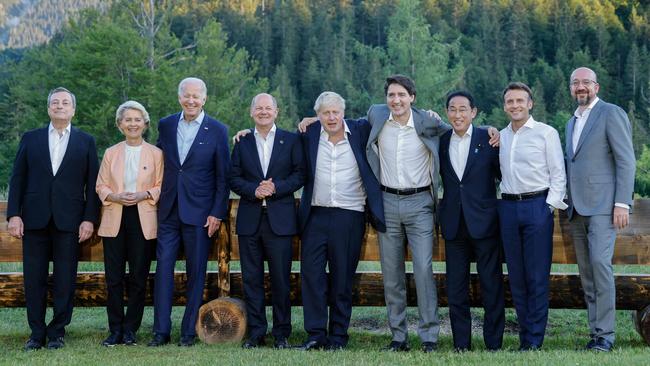Pledge of billions to beat off China
The US and allies have laid out plans to invest hundreds of billions of dollars for infrastructure projects in developing countries.

The US and allies have laid out plans to invest hundreds of billions of dollars for infrastructure projects in developing countries in an attempt to challenge autocracies and address a similar program by China.
President Joe Biden, meeting with the Group of Seven leaders in Germany, said the US would contribute $200bn over five years toward the Partnership for Global Infrastructure and Investment, from a $2bn solar project in Angola to a $600m submarine telecommunications cable connecting Singapore to France.
The US money is a combination of direct government aid and private investment, officials said. The US will aim to mobilise $600bn in overall investments with funding from allies by 2027, though many details were unknown.
“This isn’t aid or charity,” Mr Biden said, standing with G7 leaders at the Schloss Elmau resort in the Bavarian Alps.
“It’s a chance for us to share our positive vision for the future … because when democracies demonstrate what we can do, all that we have to offer, I have no doubt that we will win the competition every time.”
The announcement came on the first day of the G7 summit, where the agenda was dominated by Russia’s war against Ukraine and the economic fallout from it for Western countries that have imposed a barrage of sanctions against Moscow.
The US and its allies said on Sunday that they would ban Russian gold imports.
The allies are inching toward an agreement on expanding sanctions against Russia by looking for a mechanism to cap the purchase price of Russian oil, but the details are still being worked out.
Officials said oil was the most lucrative export for the Kremlin, while gold made up a significant part of the state revenues that fund Russian President Vladimir Putin’s war.
The details of the oil purchase price cap, which would create a buyers’ cartel of Western nations and their allies, and the gold import, both proposed by the US, were being finalised ahead of the summit’s conclusion on Tuesday.
The G7 leaders aimed to display unity in their confrontation with Russia, but an accumulation of political and economic problems at home has tested the allies’ stamina to withstand rising food and energy prices.
At the same time, the early focus on China, which is expected to carry through the G7 gathering and the NATO summit in Spain later on Tuesday, has threatened to expose older faultlines between Western allies.
Mr Biden has worked to rally allies in confronting China’s economic practices and on human rights but there are limits to how far some partners want to go.
The G7 statement on China will be a mix of clearly stating the challenge that Beijing is posing to G7 nations, including criticism of its economic behaviour, with a call for partnership in tackling global issues such as climate change, for which China was a necessary partner, a senior German government official said. “We are in favour of diversification but against decoupling,” the official said.
The G7 infrastructure projects will focus on investments in climate resilience, secure information and communications technology, gender equity and modernising health systems, including vaccine manufacturing facilities.
G7 leaders first unveiled the program at a summit in England to counter Chinese influence in developing nations, in particular its Belt and Road Initiative.
At the time, Mr Biden heralded the program as “Build Back Better World”, reflecting a sweeping domestic spending package that is now all but dead amid disagreements among Democrats.
The Belt and Road agenda launched in 2013 and has been used to expand China’s reach around the world, leading to concern from the West that some recipient countries could become increasingly economically dependent on China.
Before Sunday’s announcement, US officials criticised infrastructure models that sell “debt traps” to low- and middle-income partner countries. Studies have shown the Chinese projects have led to hidden debt, environmental hazards and corruption.
The Wall Street Journal



To join the conversation, please log in. Don't have an account? Register
Join the conversation, you are commenting as Logout